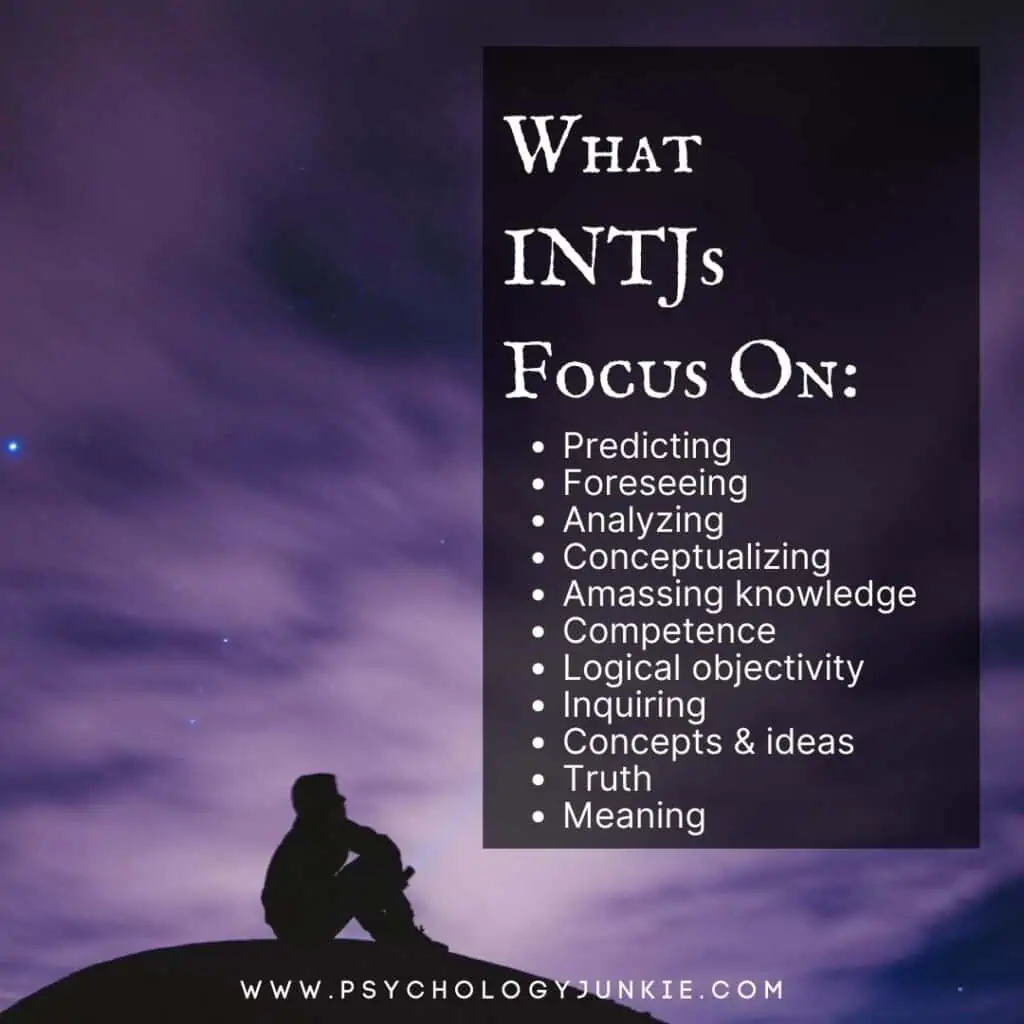Are INTJs Manipulative?
The evil mastermind INTJ is so common in fiction and so often brought up in Myers-Briggs® discussions that it’s become a sort of dark running joke. It can even be difficult to find fictional INTJs that aren’t portrayed as villains. Worse, that stereotype can support other misconceptions about INTJ personality types.
For example, some people think INTJs are manipulative.

I’m a writer and teacher by trade, so before we go any further, I want to make sure we’re all on the same page with what “manipulative” means. If you Google the definition, Oxford Languages provides this: “characterized by unscrupulous control of a situation or person.” That’s not a description of INTJs (or any other specific personality type). That’s a description of how someone who’s selfish and/or psychologically unhealthy might treat others.
In real life, however, we don’t always mean pathological manipulation when we describe someone as manipulative. We might just mean that this person usually convinces people to do what they want or that they’re good at making situations turn out in their favor. In this sense of the word, INTJs can be manipulative (and so can people of other personality types).
Not sure what your personality type is? You can take our free personality questionnaire here
Why Do Some People Think INTJs are Manipulative?
INTJs are often blunt, straightforward people who can come across as intimidating. Many also “believe in truth over tact” (to quote Susan’s INTJ type profile). I honestly wonder if some of the people who think INTJs are manipulative are just not used to people bluntly describing things the way they see them and asking for what they want/need.
If an INTJ says something like, “If you don’t do your homework, you’re going to fail this class” it might come across as a threat, but it was likely meant as a simple statement of fact. If they say, “That’s a stupid idea, and here’s what I think,” that’s not a very nice way to phrase feedback but it probably wasn’t meant to manipulate someone into thinking the same way they do. Or if they say, “I need you to do this for me,” an INTJ is likely just phrasing the request in the sort of straightforward way they’d prefer to have someone tell them things.
While any personality type can be manipulative from time to time, I suspect a lot of the times when someone thinks an INTJ is acting manipulative that impression is based on a misunderstanding. None of us think exactly alike (even if we have the same personality type) and we’re not mind-readers. That’s why it’s so important to take the time for clarifying communication with other people.
What Do INTJs Think of Manipulation?
So, here’s the thing that’s “funny” about this blog post. INTJs typically hate manipulative behavior. It’s fake. It’s unfair. They can usually see right through it. With that being the case, I’m picturing some of the INTJs reading this post getting irritated. People misinterpret them regularly, but it’s still got to be frustrating to hate manipulative behavior and yet be accused of doing that very same thing.
However, INTJs might see a difference between emotional manipulation and manipulation of a situation. The first is distasteful, the other can be strategic. Control over people isn’t something most seek, but they do enjoy having control over situations.
In terms of manipulating people, INTJs can certainly be polite and act diplomatically when there’s good reason for it and they’re willing to offer advice, but they hate playing emotional games. They might even actively avoid situations where they’d have the ability or authority to manipulate others. Manipulating other people is something many INTJs could do, but it goes against the deep value they place on personal autonomy, fairness, and justice. For many INTJs, emotional manipulation is something they simply won’t do.
In terms of manipulating situations, though, INTJs might see that simply as common sense. If you can manipulate a situation without taking away others’ free will or imposing your viewpoint on them, then why not try to work things out so there’s a good outcome in the end? Strategic, long-term planning comes naturally to many INTJs.
What Are INTJs Really Like?
Let’s think about some of the personality traits that most INTJs have. Typically, INTJs are independent people who like to work on their own or in their own way. They’re insightful and intuitive, especially about facts, patterns, and details. INTJs enjoy problem-solving, planning, and seeking new knowledge and understanding. They often choose careers or hobbies that let them do those things as part of everyday life. With their ability to recognize patterns and solve problems, they’re often great at turning their observations into theories and predictions that can be very accurate.
Those personality traits don’t stack up to make someone who’s hard-wired to manipulate other people. However, you could still meet manipulative INTJs. Whether to try and manipulate people is a choice individuals make; it’s not dictated by personality type (manipulation isn’t any type’s default state). The people I’ve met who were maliciously manipulative weren’t INTJs, but there are some manipulative INTJs out there.
If you’ve known healthy INTJs, then you probably know that they’re not usually manipulative. You’re far more likely to describe them as intelligent, honest, independent, efficient, loyal, and maybe a little intimidating. I’ve even heard people describe INTJs as “nice” or “wonderful” (a description that may puzzle the INTJ).
The truth is, INTJs are so much more than just their personality type. We all are. A Myers-Briggs® type describes how your mind functions. It’s like the toolkit you’re working with or the canvas you’re painting on to build your whole personality. Knowing your personality type or the types of other people is a starting point for understanding, not the end.
So no, INTJs aren’t naturally manipulative. Some can be, but mostly INTJs are creative, independent, no-nonsense, loyal, pattern-observing, and honest. If they try to manipulate anything, it’s usually a situation rather than a person. A healthy INTJ is far more likely to act with fairness and support other people’s autonomy than to try to manipulate them.
What Are Your Thoughts?
Do you agree with this article? Do you have any insights, thoughts, or perspectives? Let us know in the comments!
Find out more about your personality type in Susan Storm’s eBook, The INTJ – Understanding the Strategist!
Other Articles You Might Enjoy:
The INTJ Cognitive Function Stack
About the Author:
Marissa Baker is the author of The INFJ Handbook (available in the Amazon Kindle Store). You can find her online at LikeAnAnchor.com where she blogs about personal growth and development from a Christian perspective.
This article contains affiliate links to Amazon products. If you purchase one of our books via Amazon, I get a small kickback that I can use to pay for hosting and other demands of this site. I only recommend books that I love.
Subscribe to Our Newsletter

Want to discover more about personality type? Get the inside scoop with Susan Storm on all things typological, along with special subscriber freebies, and discounts on new eBooks and courses! Join our newsletter today!
















Absolutely LOVE this article. Very spot-on!
As an INTJ myself, I would tend to agree with this assessment. Since I deeply value autonomy within myself and others, it would be highly hypocritical of me to manipulate people to any substantial degree. However, ensuring the situation comes out in my favor is something I do regularly.
Highly accurate from my perspective as an INTJ. Nice analysis.
As an INTJ, I solidly agree. I know very well when I’m using my manipulative powers. As mentioned, it’s never manipulating a person, rather the situation. We are “Architects”. We like constructing our worlds to meet the highest levels of efficiency. Sometimes that includes manipulating situations to satisfy an end. It’s never done out of a dark place, but rather out of a need for improvement. Usually, when presenting my case, I will highlight the impact of the scenario before asking for what I want. The more seasoning, the more likely I am to get what I want. It’s served me really well at work. But it doesn’t just benefit me, but the entire process and future employees. It’s never selfish. Usually, it’s simply a matter of forcing someone into a corner by using logic to help them understand that a different way is the optimal one. It’s a strategy game, and we are masters. As we like to say, “If it’s not broke, it probably can be broken and fixed better. So yes, we are manipulative, and we probably know it. But we are also loyal. And that means that even if we manipulative you, if you’re a friend, you’ll benefit as well.
Loved this article. I certainly agree that INTJs have the potential to be manipulative but a healthy and mature INTJ will (1.) be disgusted by people who are manipulating and (2.) they are too busy working on themselves and their lives to waste their time on twisted emotional games.
You should make this mandatory reading for any of your site’s list makers. It’s so annoying to read character study after character study that exclusively lists villains an INTJs. Even when we get a hero with our personality type, someone swoops in with a ‘WELL, ACTUALLY,’ to try and disprove it, like with Katniss in a recent Hunger Games one. We aren’t inherently evil. We’re just not like you. And that’s fine.
I’m an ENTP (Shadow INTJ) I was more manipulative when I was younger and less experienced in the ways of the world. I have come to believe in seeking a “win-win” wherever possible. Of course, sometimes it isn’t possible, and some situations are simply a poop sandwich and everyone has to take a bite. I find INTJs amazing for the most part. They are very strategic people who tend to like moving the details around to ensure optimal efficiency. I admire this about them greatly. TBH, I think it’s the INTJ shadow side (ENTP) That makes them so commonly associated with the villian. I am not trying to turn this into an ENTP discussion when it is clearly an INTJ discussion, but here we are.
As a INTJ and forced by circumstances to deal with the public, and its expectations. I find it can be a fine line between motivating and being manipulative. This is something I constantly worry about, that of crossing that line. I do not find the interaction easy to do; but, I have with years of training (Speech, presentations, and teaching techniques) developed purposely a chameleon like approach of being personable in public. It is a “shell” I put on to achieve the necessary results. It is like I have to take on a different persona to reach people and yet not be a “phony”;but, persuasive of things I believe in and know are true. I have had to observe and analyze successful teachers and orators to achieve this competence. It does take a lot out of me and I find, I do need time to recharge my “batteries”. I have found your analysis very helpful. I have often wondered if a “type” can metamorphosis into a different personality? I think I will always be at heart an introvert, locked inside my own mind, who must interface with the outside world. But that being said I do believe a personalty can be changed for good or bad. (See Ephesians 4:24 and Colossians 3:10).
Accurate, nice article! I think some INTJs have the potential to be manipulative though, because I’ve known some that study human psychology and that in tandem with their Ni can make them almost INFJ like. Combined with bad intentions, I can see an unhealthy INTJ manipulating others to get their way.
The best description of an INTJ I have ever read. Yes, I am one and the article describes me to a T.